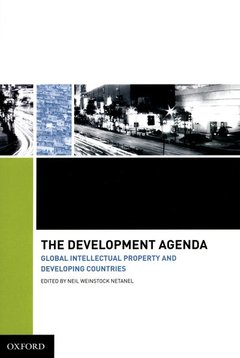Description
The Development Agenda
Global Intellectual Property and Developing Countries
Coordinator: Netanel Neil Weinstock
Language: English
Publication date: 01-2009
552 p. · 23.6x16 cm · Hardback
552 p. · 23.6x16 cm · Hardback
Description
/li>Contents
/li>Biography
/li>
The Development Agenda is the result of the recent campaign to ensure that the intellectual property treaty regime permits -- and, indeed, empowers -- developing countries to tailor their intellectual property laws as they deem necessary to promote development and serve the welfare of their citizens. The Agenda's adoption by the World Intellectual Property Organization (WIPO) in September 2007 was an historic watershed for that UN agency, which has long viewed its mandate as the unabashed promotion of greater intellectual property rights throughout the world. Written by some of the world's leading IP scholars, Neil W. Netanel has edited this compilation of articles in order to examine the Development Agenda and the broader issues it touches upon. Contributors include leading scholars from various disciplines, including economics, political science, and law, and from countries at various stages of development, including China, India, Brazil, Argentina, Chile, Nigeria, Egypt, and Israel, in addition to the US, Canada, and EU. They also include experts from NGO-think tanks, UNCTAD, and the two Brazilian diplomats who were the leading advocates of the Development Agenda's adoption.
Preface. Contributors. Chapter 1. Introduction: The WIPO Development Agenda and its Development Policy Context. The Development Agenda and the International IP Treaty Regime. Chapter 2. The Development Agenda at WIPO: Where Does it Stand?. Chapter 3. TRIPS 3.0: Policy Calibration and Innovation Displacement. The Development Agenda in Historical and Institutional Context. Chapter 4. The WIPO Development Agenda in a Historical and Political Context. Chapter 5. The Politics of Intellectual-Property Reform in Developing Countries: The Relevance of the World Intellectual Property Organization. The Development Agenda: Cautionary Notes from Two Directions. Chapter 6. History Lessons for the WIPO Development Agenda. Chapter 7. The WIPO Development Agenda: A Cautionary Note. Intellectual Property and Development: A Comparative Analysis. Chapter 8. What Direction Is The Wind Blowing? Protection of DRM in China. Chapter 9. Are National Patent Laws the Blossoming Rains?: Evidence from Domestic Innovation, Technology Transfers, and International Trade Post Patent Implementations in the. Period 1978-2002. Chapter 10. Historical Perspectives on Patent Systems in Economic Development. Access to Medicine. Chapter 11. Expanding Patent Rights in Pharmaceuticals: The Linkage Between Patents and Drug Registration. Chapter 12. Is Product Patent Protection Necessary to Spur Innovation in Developing Countries? RaD by Indian Pharmaceutical Companies after TRIPS. Chapter 13. IPRs and Technological Development in Pharmaceuticals: Who is Patenting What in Brazil after the TRIPS?. Cultural Industries. Chapter 14. The Production of Knowledge, Innovation and IP in Developing Countries: Creative Industries and the Development Agenda. Chapter 15. Arab Musiconomics, Culture, Copyright and the Commons. Chapter 16. Michael D. Birnhack, Trading Copyright: Global Pressure on Local Culture. Industry Structure, Innovation and Access. Chapter 17. Antitrust, Patents, and Developing Nations. Chapter 18. Leonardo Burlamaqui, Innovation, Competition Policies and Intellectual Property: An Evolutionary Perspective and its Policy Implications. Intellectual Property and Developing Country Citizens' Freedom. Chapter 19. Intellectual Property and Development as Freedom. Chapter 20. Contours of an International Instrument on Limitations and Exceptions.
Neil Netanel is a Professor of Law at the University of California at Los Angeles law school. Prior to joining UCLA, Netanel served for a decade on the faculty of the University of Texas at Austin School of Law, where he was the Arnold, White & Durkee Centennial Professor of Law. He has also taught at the law schools of Haifa University, the Hebrew University of Jerusalem, Tel-Aviv University, the University of Toronto, and New York University.
© 2024 LAVOISIER S.A.S.




